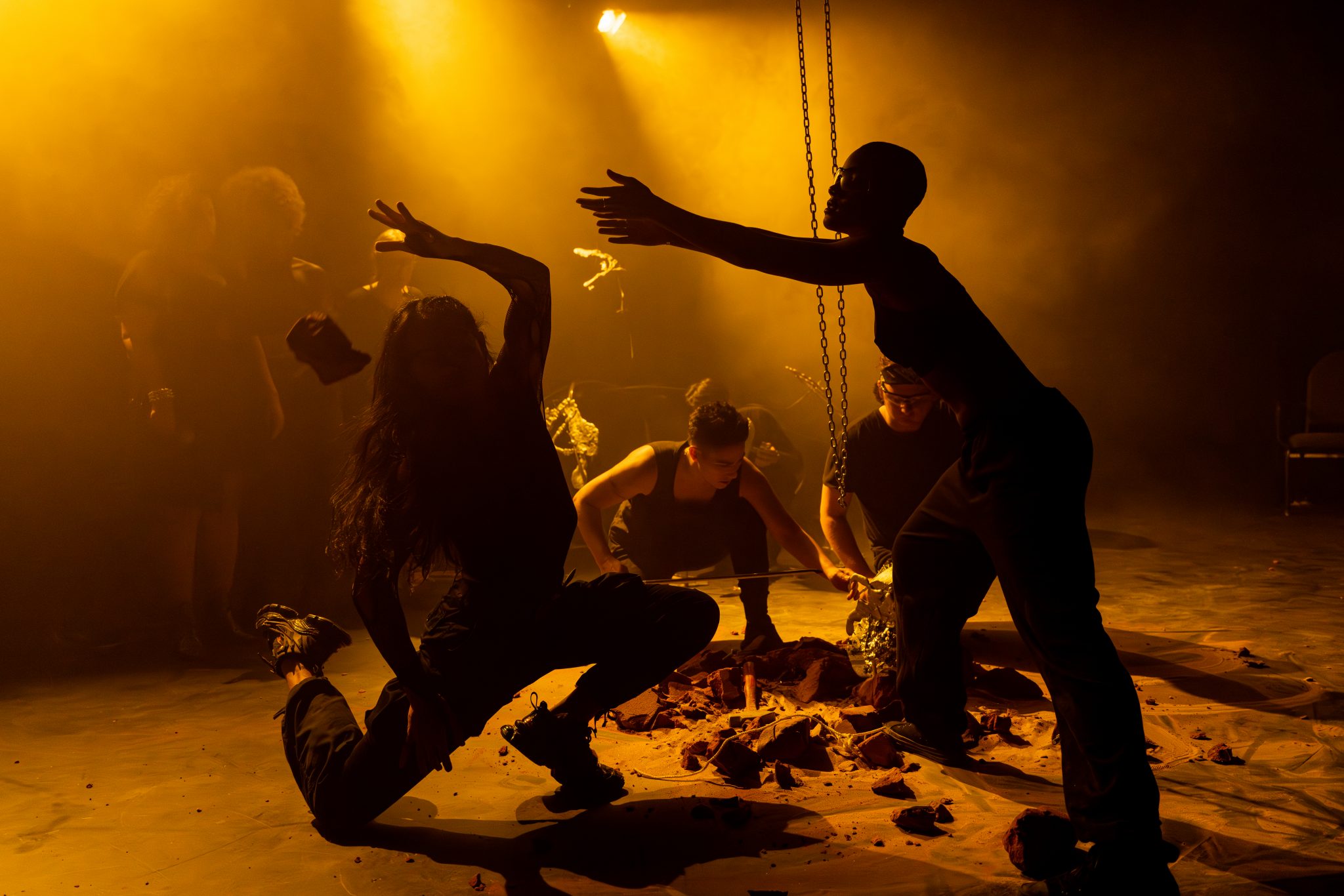Stephanie Mercedes stands above the demolished mold in the center of the black box theater. From the wreckage, she pulls out a metallic cast molded into a chalice-like shape, and knocks on it once to produce a clear ring, creating a note of clarity and beauty. The cast is then presented to the audience as one of many of its kind turned into instruments made from melted guns, reclaiming weapons of destruction in an image of beauty.
The idea of reclaiming is integral to Act III of Mercedes’ queer gun destruction opera, “Never in Our Image,” which opened at CulturalDC’s Source Theatre Friday night and runs through Sept. 23.
The opera captivates and confronts the audience through a powerful use of unconventional soundscapes to ask: “How can the LGBTQ+ community take the tools of the oppressors and transform them into music and art?”
“We’re all living in fear that something will happen to us because we’re queer … and this opera is about that daily fear that we all have, that there is that potential, because of gun accessibility in this country and because there is so much hate towards the LGBTQ community,” Mercedes said.
Mercedes received her graduate degree and taught sculpture classes at this university. She’d worked with sound and visual art for years, but after Kristi Maiselman, CulturalDC’s executive director and curator approached her for a new exhibit, she decided to explore her next project as an opera.
[Dumb Money captures how GameStop stock shook up Wall Street]
As an artist, Mercedes for years melted down guns and transformed them into sonic sculptures, soon realizing how each cast created its own distinct, beautiful sound.
“The very sound of my furnace and of me destroying weapons and retransforming them had its own soundscape,” Mercedes said. “Something I really wanted to do in this opera is to use the sound of destruction, of melting weapons and transforming them in the process of creating music.”
The opera took around two years to complete and is split into three parts. Act I was the gun cutting ceremony where contact microphones amplified sound from the hand saws and angle grinders used to cut the guns. In Act II, the score came from percussionists playing the furnace as it melted down the weapons. Act III featured Mercedes and percussionists breaking open and playing the molds from the previous acts to create a new sonic score.
Zeos Greene, one of the sound engineers and designers of the opera and Mercedes’ brother, said the production weaved together previous acts to create Act III’s unique soundscape. Each sculpture and metal frame used live was made from melted weapons, he said.
For Greene, the desired effect of combining the sounds was to create a cathartic release of emotions among the cast and audience.
Along with the casts, the soundscapes for Act III were built with acapella opera singing. Brittany Hunter, a freshman voice performance major at this university, was a singer in the opera.
[Season 3 of ‘SNAPPED’ podcast discusses the ugly side of greek life]
Hunter said that their favorite part was the “techno” section, a livelier part towards the end of the opera that created a club-like atmosphere in the theater, creating joy within the tense environment.
At one point during the show, the performers formed groups of three, which Hunter said was heavily improvised to create an authentic and emotional experience.
Improvisation is essential to the opera, with each rehearsal and performance being unique from its predecessor. Mercedes explains that the element of improv allows the performers to connect with each other on a more profound level in terms of the opera’s queer perspective.
The act of “unnaming,” which Mercedes said means removing an object or person from its perceived identity, ties the performance together. The opera’s power came from rewriting the identity of a dangerous weapon into something beautiful.
“A lot of the sculptures that we were playing yesterday, they don’t look like they have the potential to create sound, but they do create sound, and that’s important because I think that reflects the way I feel about my own queer identity,” Mercedes said. “It’s the fact that we all have the ability to shapeshift at any moment that we want.”
It’s this shapeshifting that Mercedes believes many fear. The opera highlights that no matter someone’s feelings towards weapons, guns are ultimately just metal, and their shape is not set in stone.



